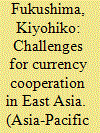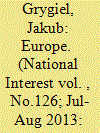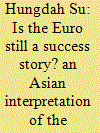| Srl | Item |
| 1 |
ID:
051898


|
|
|
|
|
| Publication |
May 2004.
|
| Summary/Abstract |
The defects of the current international financial system are creating tremendous distortions in the economies of East Asia. For the time being, most of the developing countries in East Asia have no choice but to adopt some sort of a flexible, wider band system (crawling band) while resorting to capital control when necessary, in order to avoid the recurrence of the Asian currency crisis.
Japan's approach to building a stable international financial system in East Asia has gone through several stages since the late 1970s. Though the latest approach of setting up the Asian Bond Fund (ABF) is a step in the right direction, the ABF has severe limitations in reducing the risks for the developing countries in Asia. The ABF needs to be replaced by the Asian Bond Corporation (ABC) in order to develop an international capital market in Asia and use the abundant saving in Asia for financing the growth of Asia. In the process of expanding the activities of the ABC, Asia can adopt the notional common currency based on a basket of major currencies. That notional currency will pave the way toward introducing the Asian common currency, which can be the ultimate goal for the economic cooperation and integration in East Asia.
In the meantime, while enhancing currency cooperation, East Asia needs a lender of the last resort in order to keep its economy from collapsing from another currency attack. Japan has been trying to play that role and is poised to take that responsibility as the largest and the most developed economy in the region.
International capital markets and a truly international currency must be supported by numerous institutions and intellectual frameworks. Asia is yet to build those institutions. To help build those institutions, we in East Asia need to establish a new international research institution which would coordinate the strenuous intellectual efforts needed for building institutions that bolster the international capital market in Asia. The envisaged new institute can be dubbed the "Asian Monetary Institute," or "AMI."
|
|
|
|
|
|
|
|
|
|
|
|
|
|
|
|
| 2 |
ID:
121572


|
|
|
|
|
| Publication |
2013.
|
| Summary/Abstract |
THE EUROPEAN Union's unfolding crisis tends to be seen as purely economic in nature and consequence. The EU is a common market, with a common currency adopted by most of its members and with fiscal problems of one kind or another facing almost all of its capitals. Most analyses of the euro crisis focus, therefore, on the economic and financial impact of whatever "euro exit" may occur or of a European fiscal centralization. In the worst case, they project a full-fledged breakup of the common currency and perhaps even the EU itself. Not much can be added to this sea of analysis except a pinch of skepticism: nobody really knows the full economic impact, positive or negative, of such potential developments. In fact, not even European leaders seem to have a clear idea of how to mitigate the economic and political morass of the Continent. While it is certain that the EU of the future will be different, it isn't clear just how.
|
|
|
|
|
|
|
|
|
|
|
|
|
|
|
|
| 3 |
ID:
118300


|
|
|
|
|
| Publication |
2012.
|
| Summary/Abstract |
The European Union is in crisis because it is based on a wrong understanding of political development. Its founding assumption is that a common market and a common currency would lead to a unified polity; that Europeans would arise out of the euro. This has not happened and Europe is fraying economically and politically. And the United States is not a disinterested spectator because a weaker and more divided Europe undermines a key foreign policy objective pursued over the last century-of a Europe whole, secure, and free. Consequently, it is premature for Washington to reorient its strategic attention away from Europe.
|
|
|
|
|
|
|
|
|
|
|
|
|
|
|
|
| 4 |
ID:
080049


|
|
|
|
|
| Publication |
2007.
|
| Summary/Abstract |
A long tradition of research has shown decentralized political structures as an important cause behind lower levels of redistribution and higher levels of inequality. This article offers an alternative interpretation of the association between fragmented fiscal structures and higher levels of inequality. I argue that the distributive effects of decentralization depend on the preexisting territorial patterns of inequality. Therefore, the political choice between alternative fiscal structures is largely driven by their expected distributive consequences. As a result, the territorial structure of inequality becomes an important factor to explain why some fiscal structures are more integrated than others. Two mechanisms link regional income distributions and preferences about the decentralization of redistributive policy: differences in the demand for redistribution associated with interregional income differences, and differences in the demand for social insurance associated with the incidence of labor market risks. I test the argument using a data set of fourteen countries in the Organization for Economic Cooperation and Development (OECD) over the period 1980-2000. In addition, I illustrate the potential of the approach by analyzing why social solidarity remains territorially fragmented in the European Union despite the fact that it has a common currency and a common market
|
|
|
|
|
|
|
|
|
|
|
|
|
|
|
|
| 5 |
ID:
121581


|
|
|
|
|
| Publication |
2013.
|
| Summary/Abstract |
Since outbreak of the sovereign debt crisis in several member states of the Eurozone in 2010, the Euro as a success story was suddenly thrown into doubt. In Asia, more and more scholars and policy analysts, a majority of whom had not focused their study on the EU or Euro before the crisis, have criticized the monetary integration in the Eurozone, put into doubt the value of European integration as a whole, and reiterate their pessimistic theses about the future of the European economy. This article represents a rebuttal to this criticism, arguing that the common currency is truly in difficulty but not in an impasse. A return to a success story of the Euro is still probable, if European leaders and their citizens could reestablish a balancing model between the financial discipline and economic growth in the EU, to which a general and in-depth debate over the future of European integration is indispensable.
|
|
|
|
|
|
|
|
|
|
|
|
|
|
|
|
| 6 |
ID:
114116


|
|
|
|
|
| Publication |
2012.
|
| Summary/Abstract |
The euro's naysayers have it all wrong. True, the continent's powerhouses have yet to agree on a clear plan to save the common currency, as each one is seeking to secure the best deal for itself. But they all also know that the collapse of the eurozone would be a political and economic disaster, so they will ultimately pay whatever price is necessary to keep it together.
|
|
|
|
|
|
|
|
|
|
|
|
|
|
|
|